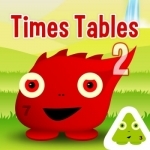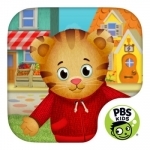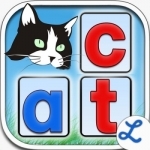
Pepe&Colori- Augmented Reality / Réalité Augmentée
Education and Entertainment
App
English version below Découvrez Pepe et Colori® en réalité augmentée en trois étapes simples...

Space by Tinybop
Education and Reference
App
Boldly go where no kid has gone before in 3, 2, 1…. Liftoff! Travel into space to visit 8...

Potty Time with Elmo
Education and Book
App
Elmo reads this animated storybook and song app that will help teach your child about potty training...

Squeebles Times Tables 2
Education and Games
App
Perfect for 5 to 11 year olds, Squeebles Times Tables 2 allows them to practise their times tables...

Explore Daniel Tiger's Neighborhood
Education and Entertainment
App
**2016 Parents' Choice - Gold Award** "The app is a charming and effective way to teach a wide...

Sweet Home Stories (Full)
Education and Games
App
Wake up and get ready! There are lots of things to do in Sweet Home Stories! A fun and safe...

Monkey Junior: kids learn to read English, Spanish
Education
App
Monkey Junior is currently #1 popular learn to read program with millions of happy learners and...

PostureScreen Mobile
Health & Fitness and Medical
App
Posture Analysis / Body Composition / Movement Screening Evaluation Software for Chiropractors,...

Montessori Crosswords - Fun Phonics Game for Kids
Education and Games
App
Based on the proven Montessori learning method, Montessori Crosswords helps kids develop their...
Hazel (1853 KP) rated Touching the Rock: An Experience of Blindness (Notes on Blindness Film Tie-in) in Books
May 23, 2017
It is not often a blind man writes a book, and “write” is a word used due to the lack of a better. John M. Hull gradually lost his sight, registering as blind in 1980, a couple of days before the birth of his son. Although anticipating the event, John struggled to come to terms with his new circumstances and adjust to a new way of living. From 1983 through to 1985, John recorded his thoughts on tape, in diary form, as a way to ascertain and understand his predicament. Originally titled Touching the Rock (1990), John’s book has been republished as Notes on Blindness after the release of the film of the same name.
Initially, John made recordings every day, dictating the everyday occurrences he encountered. Amazingly, despite his disability, John was able to continue as a university lecturer and delve deeper into the world of theology. The way John thinks things through as he speaks reflects his academic abilities. Although he may have despaired at the thoughts of not being able to see his children, he had a fairly positive outlook on life.
John’s thought capacity and religious ideology are evident in his assemblage of diary entries. As a blind person, he learns to see the world in an alternative way, and often feels closer to God as a result. Through these new experiences, John begins to see the light despite the darkness.
The metaphorical descriptions of blindness help the reader to understand the horror and difficulties not being able to see visually provokes. This is heightened by John’s recordings of the bad dreams he often suffers, in which he is able to see. His fixations on these dreams are assumedly a fascination with visual imagery, which he does not have access to in his waking life.
It is hard not feel sorry for John as he reports the conversations he has with his young children. The effort to communicate and play with them is far greater than a seeing parent. Remarkably, as John begins to adjust to his new lifestyle, his children take the situation in their stride.
Notes on Blindness is also an educational narrative for those without sight problems. John explains the things other people, in attempts to be helpful, do that result in making things far more confusing for John as he tries to navigate his way from one place to another. Despite what most think, blind people are fairly good at walking routes they are familiar with, and, with the help of a stick, can safely travel through new areas. Once people start shouting instructions, it is difficult to pay attention to the location and listen to everyone else at the same time.
John’s voice is extremely articulate, and his thoughts profound, which may suggest heavy editing when compiling the recordings into written form. However, as he is an academician, his eloquence of speech does not feel forced or faked.
Notes on Blindness remains the same as the original publication but with the added inclusion of an introduction by Cathy Rentzenbrink, and an epilogue by his wife Marilyn, written in 2016, a year after his death. These, the latter in particular, provide an insight into how John’s blindness affected those around him and emphasises what a truly remarkable man he was.
Of the many memoirs available on bookshelves today, Notes on Blindness is a truly unique publication. It is not telling a story, or recounting a well-lived life, but gives great insight into the world of the blind. As John’s thoughts were not originally recorded with intention of being available to everyone, they are all the more personal and honest, provoking emotion and providing the reader with a new way of seeing. It is a book that will stay with you for a very long time.
